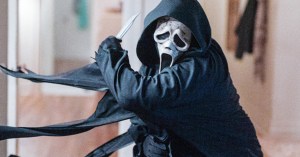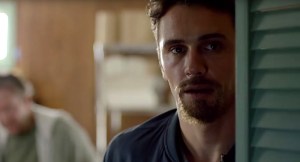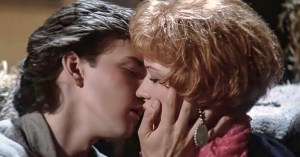Kevin Costner’s 10 Best Movies
In this week's Total Recall, we count down the best-reviewed work of the Black or White star.
Kevin Costner has played Robin Hood, Bull Durham, and Superman’s dad, but this weekend, he scales things down a little in Black or White, a family drama with a timely storyline that attempts to explore modern racial dynamics in America. Costner’s latest project gives us the perfect chance to take a fond look back at some of the many movies that helped make him the Academy Award-winning actor and director he is today — an impressively diverse list that we’re betting might include a few surprises. It’s time for Total Recall!
10. Silverado (1985) 78%
Once you cast Brian Dennehy as your movie’s bad guy, you’ve won half the battle. Fortunately for Silverado director/co-writer Lawrence Kasdan, he also managed to line up a pretty capable cast of heroes for his stylishly assembled Western. Kevins Costner and Kline, Scott Glenn and Danny Glover all saddled up and rode against Dennehy’s crooked sheriff, and even the supporting cast managed to shine, with memorable turns from Jeff Goldblum, Linda Hunt, and Rosanna Arquette. Westerns weren’t exactly in vogue during the mid-1980s — especially ones as unabashedly retro as this one — but according to most critics, Silverado made it work; as Roger Ebert wrote, “This is a story, you will agree, that has been told before. What distinguishes Kasdan’s telling of it is the style and energy he brings to the project.”
9. Open Range (2003) 79%
Following 1999’s For Love of the Game and Message in a Bottle, Costner laid relatively low for a few years, appearing in offbeat fare like 3000 Miles to Graceland and Dragonfly — and re-indulging his passion for Westerns with 2003’s Open Range, which found him directing and starring in the tale of a cattleman (Robert Duvall) who winds up tangling with a villainous land baron (Michael Gambon) in a pitched battle for the soul of a small town. An unlikely medium-sized hit, Range resonated with critics like Blake Wright of ComingSoon.net, who wrote, “Costner as director goes to great lengths to make sure the audience sees people here. Real people. Not some caricature of prototypical gunslingers.”
8. The Untouchables (1987) 83%
In 1987, we had Stallone and Schwarzenegger for action heroes, so it wouldn’t have been unreasonable to ask why we needed Kevin Costner joining the ranks — as Eliot Ness, no less, battling Al Capone (Robert De Niro) in an old-school feds ‘n’ gangsters saga whose outcome was well-known to even the dullest grade-schooler. Brian De Palma answered that question in style with The Untouchables, an artfully slick, thoroughly well-cast dramatic thriller that surrounded Costner and De Niro with a crew of capable veterans (including Sean Connery and Andy Garcia) and propped the whole thing up with a screenplay from the talented David Mamet. “It goes to that place that all films aspiring to greatness must attain,” nodded an appreciative Richard Schickel for Time. “The country of myth, where all the figures must be larger and more vivid than life.”
7. A Perfect World (1993) 77%
In 1993, any movie starring Clint Eastwood and Kevin Costner would have seemed like an automatic hit — and when you throw in that it was directed by Eastwood and scripted by John Lee Hancock (The Blind Side), it’s sort of puzzling that A Perfect World failed to drum up much excitement at the box office. Then again, it’s a quiet little picture, with an escaped convict for a protagonist (Costner) and a drawling lawman for a hero (Eastwood). Content to let its conflicts develop slowly — and end in rather anticlimactic fashion — it proved a hard sell with filmgoers while earning plenty of critical praise. “A Perfect World,” argued ReelViews’ James Berardinelli, “is evidence that Hollywood is still capable of producing the kinds of moving, intelligent movies that have increasingly become the province of independent filmmakers.”
6. Dances With Wolves (1990) 87%
A three-hour Western with subtitles, budget problems, and a first-time director who also happened to be the star and producer, Dances with Wolves was pegged by many pundits as one of 1990’s biggest cinematic disasters; before it arrived in theaters on November 9, it had already been nicknamed Kevin’s Gate — a derisive reminder of the career disaster that befell director Michael Cimino after making the similarly epic Heaven’s Gate. Of course, we all know how things worked out: Costner’s faith in the Michael Blake novel fueled five years of development and inspired him to shell out millions of his personal fortune in addition to mounting a difficult outdoor shoot while starring in the leading role, and all that passion spilled over onto the screen, helping turn Wolves into a $424 million hit and seven-time Academy Award winner. Although Costner’s taste for sprawling dramas would eventually get him into trouble with Waterworld and The Postman, he struck a chord with this sensitive saga of a Civil War soldier who retreats into frontier solitude; as Sheila Benson wrote for the Los Angeles Times, “Dances with Wolves is a clear-eyed vision. Authentic as an Edward Curtis photograph, lyrical as a George Catlin oil or a Karl Bodmer landscape, this is a film with a pure ring to it.”
5. Thirteen Days (2000) 83%
Nearly a decade after he scored a huge hit with JFK, Kevin Costner starred in another film that drew inspiration from events surrounding the Kennedy administration: Thirteen Days, which found Costner playing presidential aide Kenneth O’Donnell alongside Bruce Greenwood (JFK) and Steven Culp (Bobby Kennedy) in a tense behind-the-scenes dramatization of what went down in the White House during the Cuban Missile Crisis of 1962. While it wasn’t a huge hit during its theatrical run, Days scored with critics such as Eric Harrison of the Houston Chronicle, who mused, “Who would’ve thought this nearly 40-year-old piece of history could be turned into such a riveting motion picture?”
4. JFK (1991) 85%
A two-time Oscar winner and controversial, career-rejuvenating smash hit for Oliver Stone, JFK reconstructs John F. Kennedy’s assassination and then spends most of its epic 189-minute length sifting through the wreckage, treating the killing as a murder mystery that New Orleans D.A. Jim Garrison (Kevin Costner) doggedly attempts to solve at any cost. With an impeccable supporting cast that included Sissy Spacek, Kevin Bacon, Tommy Lee Jones, and Gary Oldman, as well as a screenplay that challenged long-held assumptions about Kennedy’s death, JFK reignited interest in the assassination, eventually leading to new legislation that ordered a reinvestigation and promised that all documents related to the killing would be made public by 2017. And while many critics agreed that the movie could have benefited from a more rigorous approach to the facts, it remains, in the words of the Washington Post’s Desson Thomson, “A riveting marriage of fact and fiction.”
3. Field of Dreams (1989) 88%
Go on and say it: If you build it, they will come. An unlikely-seeming catchphrase from an unlikely-seeming hit, it served as the mission statement for farmer Ray Kinsella (Costner), whose mystical journey toward healing the long-buried scars of his past started after he heeded those whispered words and plowed under his corn to build his own ballfield. It’s the kind of movie that doesn’t necessarily play well on paper, but whose themes are guaranteed to tug at the heartstrings of nine out of every 10 filmgoers who ever had a father. As Phil Villarreal put it for the Arizona Daily Star, it’s “A movie for a thorough tear-duct cleansing – the only film that makes tears stream down the cheeks of this hardened critic, and it gets me at least twice every time.”
2. No Way Out (1987) 92%
A year before he officially entered the ranks of swoonworthy Hollywood leading men with Bull Durham, Costner helped create one of the better political intrigue thrillers of the 1980s in No Way Out. Adapted from Kenneth Fearing’s 1946 novel The Big Clock, it’s fairly florid stuff, involving a young Navy officer (Costner) whose affair with a D.C. socialite (Sean Young) complicates his life when he discovers she has another lover (Gene Hackman) who just happens to be the Secretary of Defense — and who ends up assigning him to investigate her death after she’s murdered. The twists and secrets pile up, but they’re anchored in believable behavior and fine performances from the cast; as Roger Ebert wrote, No Way Out is “A superior example of the genre, a film in which a simple situation grows more and more complex until it turns into a nightmare not only for the hero but also for everyone associated with him.”
1. Bull Durham (1988) 97%
It’s nominally a movie about baseball, and one whose most important relationship arguably lies between an aging catcher (Kevin Costner) and the young pitcher (Tim Robbins) he’s been tasked with mentoring — but Bull Durham is also a love triangle that rests on the primal, irresistible magnetism of the woman in the middle (Sarandon). Though it was initially something of a minor hit that netted Sarandon a Golden Globe nomination, Durham has steadily grown in stature over the years; today, it’s regarded as a sports cinema classic, a high point of ’80s romantic comedy, and the apex of writer/director Ron Shelton’s career. “Shelton locates the tension and the humor between pitches, between ball games, between the sheets,” applauded TIME’s Richard Corliss. “It helps too that he has written the wittiest, busiest screenplay since Moonstruck, and that his three stars do their very best screen work.”
Finally, here’s a pre-fame Costner in a commercial for the Apple Lisa II::





